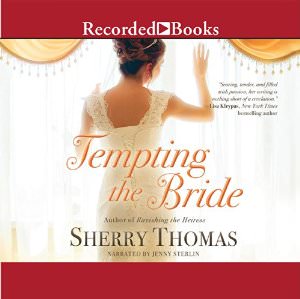 Narrated by Jenny Sterlin
Narrated by Jenny Sterlin
The third novel in Ms Thomas’ Fitzhugh Trilogy, Tempting the Bride is the story of Helena Fitzhugh (twin sister of Fitz from Ravishing the Heiress) and David Hillsborough, Viscount Hastings. The pair has appeared in secondary roles in the previous books and has the sort of antagonistic relationship which is most definitely NOT one of those “we-bicker-but-only-because-we’re-trying-to-hide-our-mutual-attraction” associations so beloved of romantic novels. No, Helena detests the ground Hastings walks on, and it seems he returns the favour.
In reality, however, Hastings has been desperately in love with Helena since he was fourteen, and, in the way of the hormonally challenged teenaged boy, resorted to insults, practical jokes and, later, sexual innuendo in an attempt to get her to notice him. Unfortunately, while he has grown up in all other respects, when it comes to Helena, he has never been able to progress beyond the metaphorical pigtail-pulling, which has become more and more barbed as the years have progressed. He has reached a point where he can’t see how he can possibly pull himself out of the pit he’s spent half his life digging.
Helena may be the wealthy sister of an earl, but her independent nature, university education and ownership of a publishing house mean that she is walking a societal tight-rope. One false step could lead to social ostracism, and it seems she is heading for just that disaster, for she is in love with a married man.
Hastings is the one person who can see all this clearly, and he warns Helena off on several occasions. The problem, of course, is that because the warnings come from him, she refuses to see the sense of what he tells her and not only ignores him, but becomes even more determined in her pursuit and reckless in her actions. Things come to a head when Helena and her lover, Andrew Martin, walk into a trap laid by Martin’s busy-body sister-in-law; only Hasting’s quick-thinking stands between her and ruin and while his actions avert disaster, she is compromised and they are obliged to marry.
Helena is in despair, as is David, who knows that a marriage between them will only make things worse. But the next day, Helena is seriously injured in an accident, which changes everything. When she eventually recovers consciousness, Helena is found to have amnesia. She has not forgotten everything, just most of the last decade or so, so that she is surprised to see her brother and sister as adults and to learn that they are both married and that her sister is expecting. But she doesn’t remember David at all – all she knows is that she has woken to find an utterly gorgeous man sitting by her bed who identifies himself as her husband.
Sherry Thomas has written a number of “second-chance” romances, (Private Arrangements, Not Quite a Husband
, Ravishing the Heiress
for example) and I admit it’s a trope of which I’m quite fond. Here, however, she has put a different spin on it, by essentially “resetting” Helena’s mind, which enables her to see Hastings as he truly is, without the veil of prejudice through which she has seen him for over a decade, and allowing Hastings to drop his act around her and just be himself – a kind, thoughtful and considerate man who loves her with all his heart.
As Helena’s recovery progresses, she begins to regain pieces of her memory. Hastings knows she will eventually remember him and their prior relationship, and that anything they build together is likely to be snatched away without a moment’s notice. This, for me, is the emotional heart of the story – Hastings knows that this second chance is likely to change nothing, but he decides to take it anyway, opening himself up to the possibility of a rejection that will undoubtedly be complete and final. But he wants the chance to treat Helena in the way he feels she’s always deserved, and even though heartbreak is a very real risk, he cannot now be less than honest with the woman he’s loved for so long.
Helena is a harder character to like and root for, which makes it all the more satisfying when she finally takes a long hard look at herself and admits how selfish she has been and how her reckless behaviour could have impacted on others. Her eventual realisation of just what she has in Hastings is truly affecting, and finally won me over.
Their new relationship is an absolute delight; affectionate and flirtatious, showing them and the listener the true depth of feeling between them and, for Hastings, bringing home most forcefully just what they could have had if he’d been able to confess the true nature of his feelings for Helena earlier. The sexual tension between them is deliciously potent, and, with two such passionate natures involved, the love scenes do not disappoint.
Jenny Sterlin has narrated all three books in this series and delivers another expressive and accomplished performance. My one reservation is that her voice has rather a nasal quality to it, which, even though I’ve heard it a number of times before, always unsettles me a little at first. Fortunately, however, the story is so immediately compelling as to lessen the impact of that particular characteristic, and very soon, I found it to be almost entirely unnoticeable.
When I looked back at my review of Ravishing the Heiress to remind myself of what I’d said about Ms Sterlin’s performance, I was reminded of my comments about the sometimes unattractive drawl she’d given to Hastings. She has retained that here, and at the beginning of the book, he is still in possession of those slightly pompous-sounding, nasally inflections. But when he is able to drop the bored, man-about-town act he usually maintains with Helena, Ms Sterlin adjusts his manner of speech to reflect that, and the drawl disappears, to be replaced by rather attractive notes of tenderness, warmth and humour which allow David’s true self to shine through.
She differentiates between the principal characters well and subtly, and the secondary characters are all rendered vividly through a variety of tones and accents. Her interpretation of Andrew Martin is especially good, as she skilfully conveys to the listener the essence of the man – a slightly bumbling academic who is rather overawed by Helena – allowing us to see him as he really is when Helena is still viewing him through rose-tinted spectacles.
This book is certainly not as angst-laden as Ravishing the Heiress, but that isn’t necessarily a bad thing, and it still packs a fair emotional punch. I thoroughly enjoyed listening to it, and have no hesitation in giving it a hearty recommendation.
Caz
Narration: B+
Book Content: A-
Steam Factor: Glad I had my earbuds in
Violence: None
Genre: Historical Romance
Publisher: Recorded Books




I love Sherry Thomas’ books and although Jenny Sterlin is not a favorite narrator, I’m so completely taken with the author’s writing that I find myself enjoying nearly everything that I hear. My grades are the same as yours Caz.
Well, it’s always nice to get an endorsement from the boss :) I do enjoy Jenny Sterlin’s narrations – I just take a few minutes to adjust to that particular quality in her voice.
Jenny Sterlin narrates one of my favorite series by Jo Goodman. The Compass Club. She also did the early Duncan Kincaid series in audio by Deborah Crombie. I like her. I like her narrations a whole lot better than some of the newer historical narrators that are very popular these days.
I just downloaded “Beguiling the Beauty” and “Ravishing the Heiress”. I loved the Fitzhughs in print, so I have high expectations for the audios.
Thanks for the review.
I’ve enjoyed this trilogy very much, Mel – I hope you do the same. I think my favourite is Ravishing the Heiress, but I realise that not everyone likes such a high angst-quotient! Do pop back (or drop by my blog) to let me know what you think.